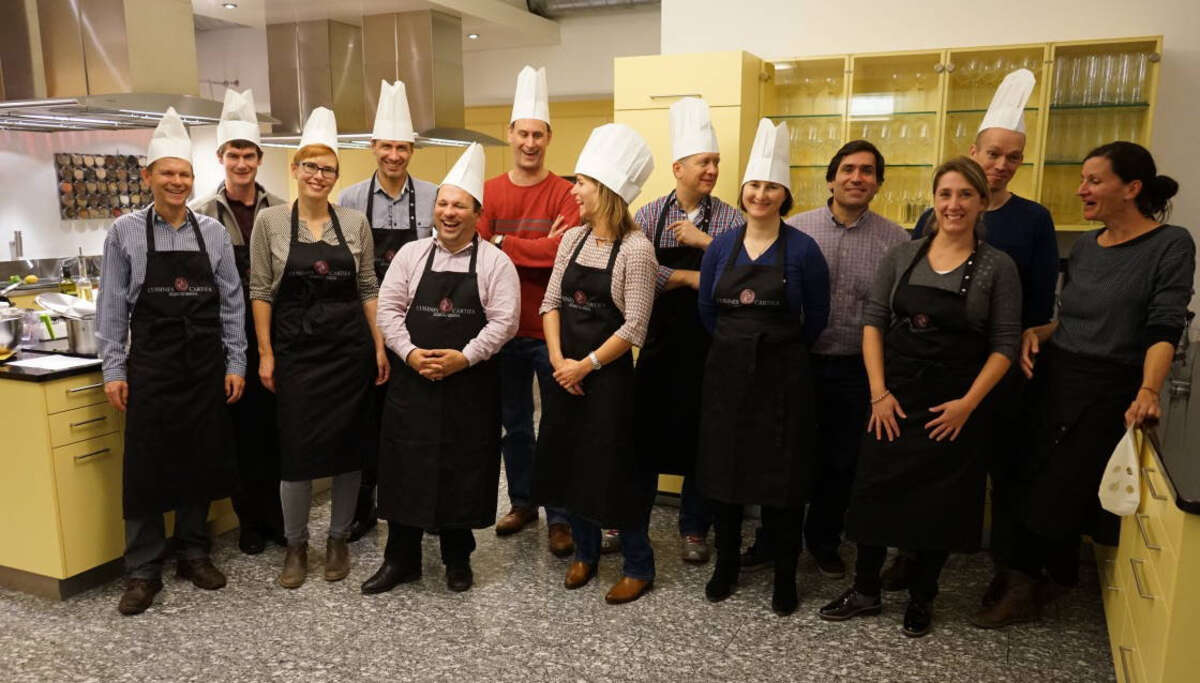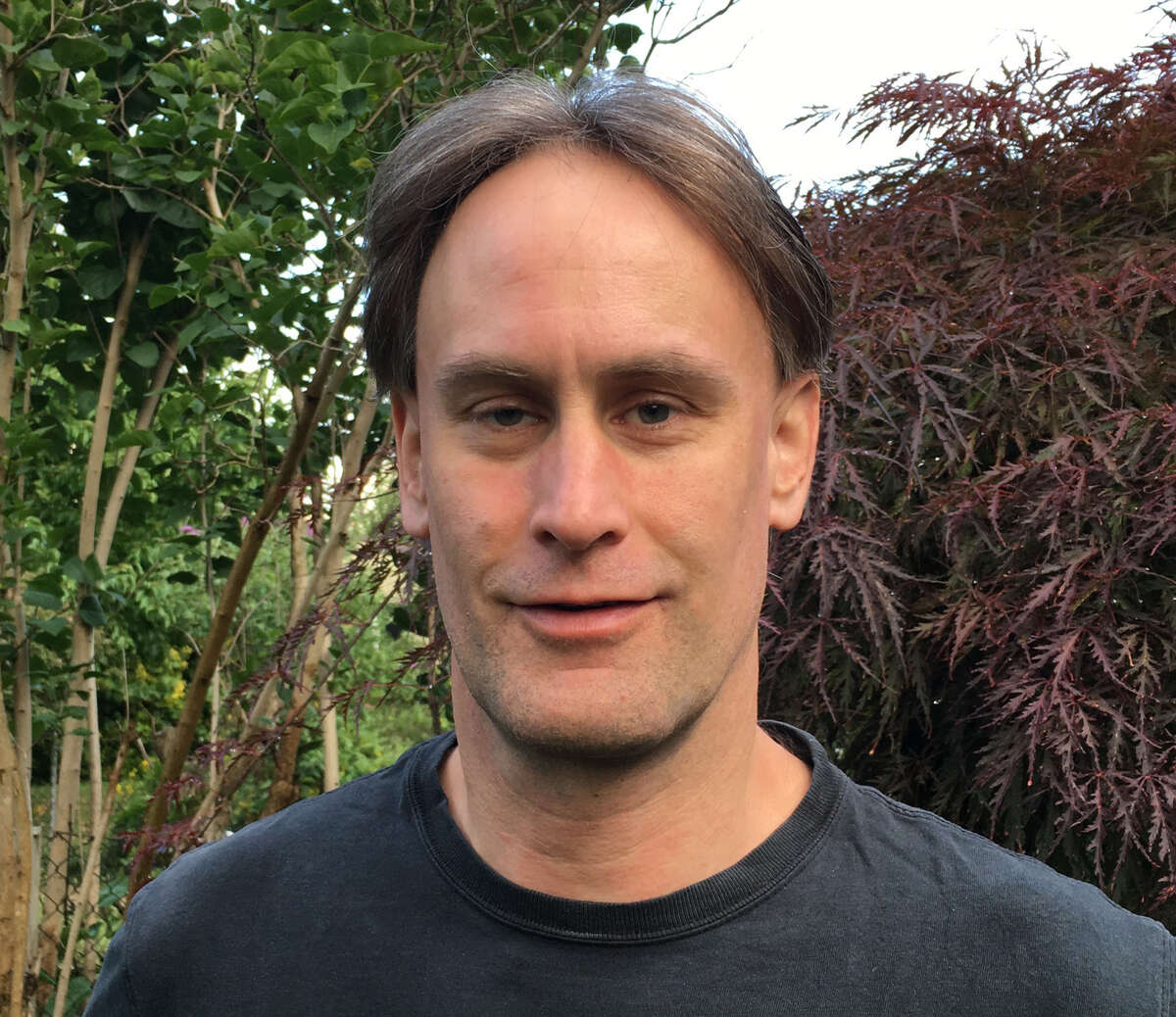From block course to cooking class.
July 2018
In the block course they were simply known as the Nirvanas. Twenty years on, in a cooking class, their hair now short, yet each slipped back into his old role. The Biozentrum alumnus Björn Grünenfelder remembers many such stories – from the past and present. Only the approaching nightfall draws our long but entertaining discussion to a close.

Your family roots are in Sweden. How closely are you connected to this country?
I was actually born and raised in Lucerne, but my mother is Swedish and a large part of her family still live in Sweden. I don’t really foster any Swedish traditions except Christmas, which we celebrate in the traditional Swedish manner. Each year, we are also drawn back to Sweden for the summer holidays. This usually also includes visiting our relatives. And I had a great time in Sweden during my studies.
What did you do there?
At the end of my studies, in the mid 90s, I made a conscious decision to go to Sweden for my diploma thesis. I lived in Uppsala for a year and worked at the university. Being fluent in Swedish was certainly an advantage. Five of us shared an apartment in the student home. One of my flat mates was a physicist and I still keep up contact with him. I worked very much in those days but I also found enough time for my social life. The Swedes really know how to party.
And what brought you to Uppsala?
From the beginning, I had the region around Stockholm on my radar. When I was studying there was no Internet as we know it today. I remember well that I asked Martin Spiess for the EMBO directory. It contained all its member’s addresses. I picked out several Swedish professors and faxed them. At the time, there was a public fax machine on the first floor of the Biozentrum. Twice each day I would go to check whether someone had sent me an answer. My block course colleagues caught wind of this and seized the opportunity to pull a prank. They sent me a “fake fax”, offering a job doing elk electrophoresis. Their breakout of chuckling behind me, gave them away.
Speaking of the block course. What was your experience of it?
I don’t think much has changed since then. We had block courses, throughout the year, in various disciplines. We stood at the lab bench from morning to night and learnt all the skills needed for scientific work. This intense time forged a close bond between us. We were forty students and always carried out experiments in groups … it was not unlike following a recipe. Our group was only made up of longhaired men, which inspired our name: The Nirvanas.
Do you still all meet sometimes?
Yes, about two years ago we had a reunion. We took a cooking class together. Each of us resurrected his old alter ego and it was astonishing to see that the group dynamic when cooking was very similar to that earlier in the block course; who pitched in, who gave instructions, who stayed in the background. It was very amusing. And I still occasionally meet one or the other from the block course.
After finishing your diploma thesis in Sweden, why did you return to the Biozentrum?
When I came back for my diploma exams, I heard that a young professor from Stanford had just started at the Biozentrum and that he was doing research in a field that interested me. This was Urs Jenal, and so I became his first PhD student. We were a rather small group but it was intellectually very stimulating. My thesis dealt with the regulation of the bacterial cell cycle.An:
And then you did a postdoc in the USA. Did you want to pursue an academic career?
In fact, after my PhD, I had the plan to become a professor, in the back of my mind. That is why I looked around for a postdoctoral position in the United States. I also wanted to change my research topic as, after four years, I had the feeling that I should do something completely new. I reoriented myself and joined a lab working on malaria. Unfortunately, it did not work as I had imagined. That was an absolute low point. So, I changed directions again. During this period, I thought much about my future: Could I really see myself working in the same field for 30 years or longer? However, I am more of a generalist than a specialist and that’s why I quit this career path.
What happened then? Moving to industry is generally not quite so simple.
Getting your foot in the door isn’t that easy. Good fortune also helped me. I was in California and looking for a job at Roche or Novartis in Switzerland. Quite a formidable challenge. However, I was lucky that Novartis was just establishing a new research center in Cambridge, Boston, and had created new positions for over 1000 scientists. I applied for a position as Scientific Education Manager and got it. My job was to initiate internal further education in science, organize courses, coach postdocs and develop the didactic structure of a curriculum. As I enjoy working with people and solving problems, it suited me. After two years, my position was transferred to Basel and I returned to Basel with wife, kids and cat.
And what do you do today?
Now I am a Senior Global Program Manager in oncology. I supervise the late-stage clinical trials. This means coordinating the various teams worldwide, developing strategies and project plans, taking care of the budget and I am also involved in setting up clinical trials, as well as the positioning and approval of drugs. Three major phase 3 trials and numerous smaller studies are currently underway in my program. The five-year phase 3 trials alone cost 400 million Swiss francs. So, you have to be able to convince the key persons that it is worth investing the money. It is important to have a scientific thinking and approach. Without the experiences I had in the past, my career would not have taken this path. The time at the Biozentrum was a good school for learning to ask the right questions. And in all the years, I have never lost my sense of curiosity.
Curiosity is a good cue. When did you last do something for the first time?
Let me think for a moment. That was not so long ago. I recently started a diving course together with a friend from my uni days – block course 1994/95.
Curriculum vitae
Since 2005, Björn Grünenfelder has been working for Novartis, initially as a Scientific Education Manager and since 2015 as a Senior Global Program Manager. The Lucerne born scientist with Swedish roots studied molecular biology and biochemistry at the Biozentrum of the University of Basel. He completed his diploma thesis at Uppsala University and returned to the Biozentrum as a PhD student. After graduating in Urs Jenal’s group, he continued researching as a postdoctoral fellow at The Scripps Research Institute.



